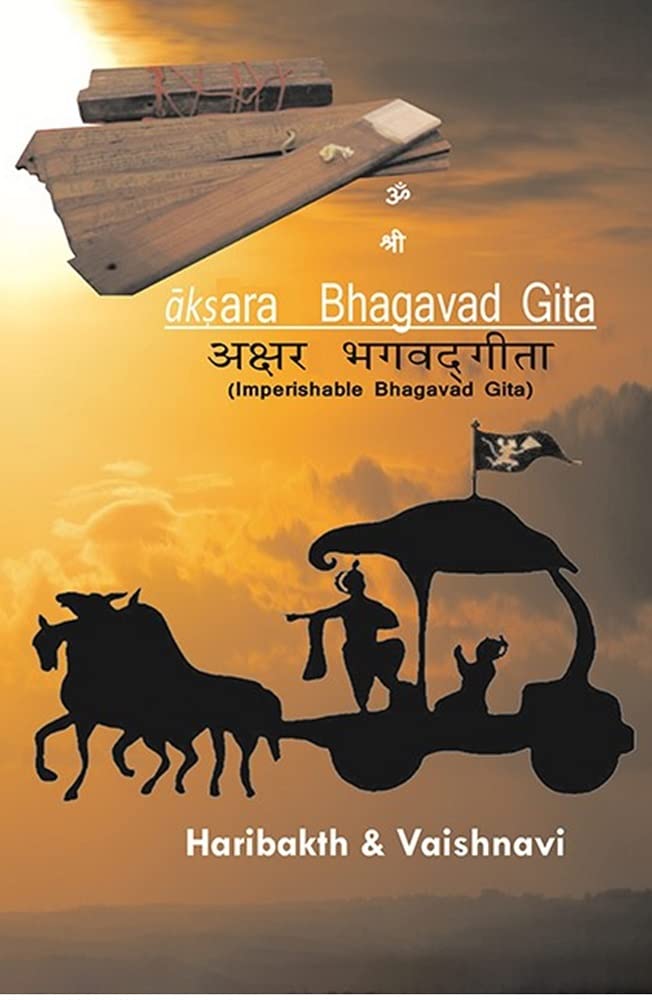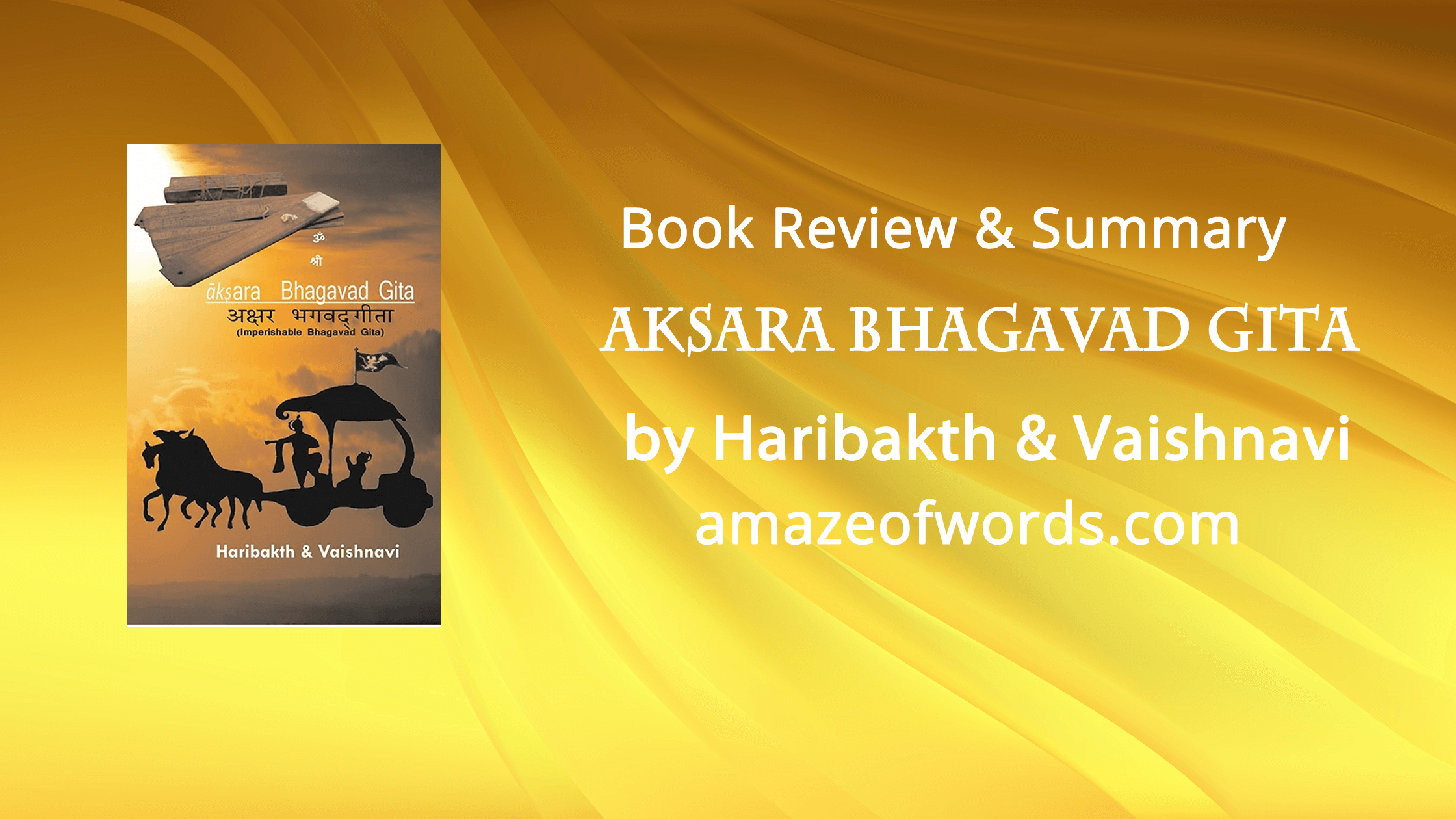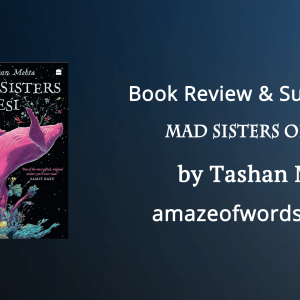BLURB
A First — Book on hermeneutics of the Bhagavad Gita, Polemic style with a story woven around to make it interesting. 1.5 Lakh words, 11 illustrations. Identifies rules to interpret Gita from Gita itslef and seeks to codify the same. A cosmopolitan interpretation of Gita, inclusive and universal in outlook, subsuming all the interpretations and it’s variants in existence thus far. Serves as a template to interpret any scripture of any religion, any philosophy, or any ideology of any denomination. All of these sourced from the Bhagavad Gita.

AUTHOR: Haribakth Rao & Vaishnavi Rao
PUBLISHED ON: 25th December 2020
GENRE: Mythology in detail
RATING: 4 Stars
REVIEW :
This book.! Oh my gosh. Let me first start with the fact that it has been a long time since I picked up mythology. In India, you are constantly surrounded by religions. Not just one but many. And each religion has their own teachings or principles. Even in Hindu, we have so many religions. Now, reason I said this is because reading this book was a little challenging. Being a Hindu, there were many terms and ideologies that I am familiar with. But at the same time, there is just so many things that make you stop and think and re-assess your thoughts.
Aksara Bhagavad Gita was took me by a pleasant surprise, making me think what I really knew and try to understand how to balance the materialistic purpose with the actual purpose. Let’s slowly break this down. The process of life, the birth and the death- the aim of Moksha, that is the main goal of a human. But is attaining Moksha so easy? If yes, why isn’t everyone on their way towards Moksha and in the world we are living, I think we are constantly in the web of things that may somehow question ourselves. Is what we are doing, right? Or not? And how can we decide what is right and what is wrong. In this world where our material goals have over shadowed our spiritual life, the question of why practice spirituality always nags us. A friend of mine suggested me long time ago, read Bhagavad Gita, it will help you receive all the answers to your problems and now I think I know why.
Before I talk about how much I enjoyed reading Aksara Bhagavad Gita or what I loved, I first want to talk about the writing. This book has a lot of different tones to writing. There are conversations flowing between different people, legal jargons used, texts from Gita, sholaks used and so much more. But I don’t think I there was even a single time where I was overwhelmed or unsure of what was going around. And it shows how much attention was paid on the craft.
Now coming to the aspects of Bhagavad Gita. I enjoyed how everything was a blend to our modern world. Bhagavad Gita was written decades ago or rather centuries ago and blending it with modern aspect fulfilled exactly what I wanted to read. A different approach. A new perspective. Throughout the book as I saw them engaged in a debate and raise points, I was nodding because yes, I had a different opinion, a different view too. But as I read and re-read some aspects, I found myself trying to understand some points that I never considered before.
“Don’t trade knowledge and wisdom for wrath and lust.”
When there is abundance all around, how to decide what to do? What is correct and with the limitless information easily available, what is ‘THE’ correct path? Is it something that is taught or something that is most easy to follow? What is the ccorrect religion to follow? What is THE Dharma?
There is no single- word translation for dharma in English. The term dharma has a number of meanings . Basically it means “what is right.”
Out of all the topics discussed and believe me they all had their own importance and impact on my thinking. The one that got me thinking most was the topic of death, grief and worship. Since each topic had it’s own example and fortunately related with Mahabharata, I enjoyed it a lot. How despite death being part of our life, we are so reluctant to accept it. How we mourn for people and are people worthy of our grief?
” Arjuna says that Bhishma and Dronacharya are worthy of worship. ”
And since we are talking about death, a couple of sentences that will stay with me, Fight for your reputation and But it is reputation which follows even after death. These sentences make you think, don’t they?
It is so difficult to stop a point because all the topics that are covered be it the debate to follow the words said by Gita or as interpreted by Guru. Who is superior, everyone interprets Gita in their own way, how at the end the only thing that matters is God. How it is God, who should be in your thoughts every moment of time and how much importance we have given to fact that when you die, you should think about God. And the interesting aspect was when the question was raised how do we know when we will die and that is why you should always think about him, because you don’t know when you will die. And the most important GITA IS COMPLETE KNOWLEDGE. I won’t lie, I still have some doubts but I have come to understand how much true that one sentence is and more than that the fact that if when you are stuck, instead of wallowing in despair, if you turn to the right place, Gita, you can find answers to almost all of your problems.
From how Earth is the birthplace to sins to the different aspects of sacrifice, how our mind works and most importantly how God is One- how Aksara Bhagavad Gita covers all the aspects. And what won me for this book was how much we enjoy different perspective. How each topic has different set of eyes, different set of opinions and there is a detailed response for each aspect. I honestly loved it.
I would like to add how much I enjoyed the illustrations towards the end. And what is the best part? If you can observe or just focus on the illustrations they can give all the answers you want.
Reading Aksara Bhagavad Gita was different and in a way, thought provoking. I definitely will be looking back and re-visit so many parts of this book and try to understand life in a better way. And as Christina proved with constant efforts and perseverance you can study anything, understand anything.
If you enjoy my content, you can support me here.
ABOUT THE AUTHOR:
Ravindra Rao writes under the pen name of Haribakth, which reflects an identity adopted by him and reveals a part of his personality. He is an alumnus of Marathwada University, Aurangabad, India having a Masters degree in commerce and a bachelor’s degree in law. He has graduated from Osmania University, Hyderabad. He was an IT officer in a Govt Bank and quit the job in 2015, after 34 years of service to pursue his passion, The Bhagavad Gita.
=====
You can read the review for The Coward by Stephen Aryan here.
You can read the review for The Blood of Outcasts here.
You can read the review for A King’s Radiance here.
You can read an article for Creation & Destruction here.




